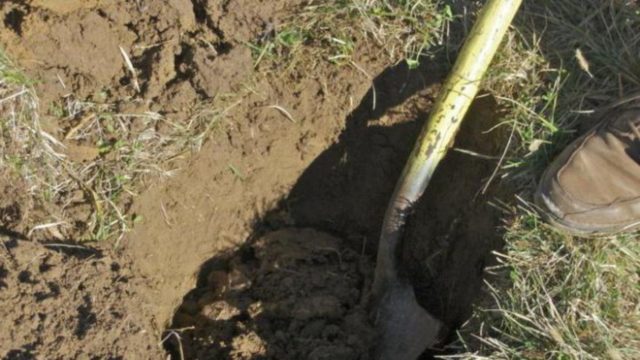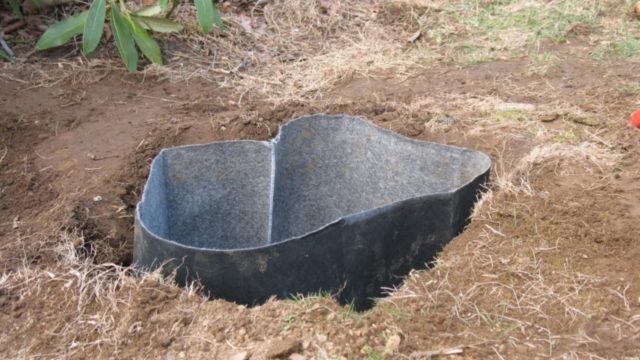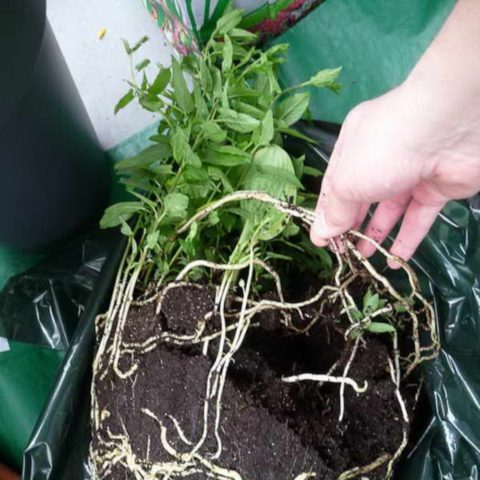Content
Terry Calystegia (Calystegia Hederifolia) is a vine with effective pink flowers, which gardeners often use as an element of landscape design. The plant is characterized by high frost resistance and endurance. At the same time, kalistegia retains its decorative effect until the first autumn frosts. But in order for the vine to fully develop and bloom profusely, it must be properly planted and cared for, taking into account the requirements of the culture.
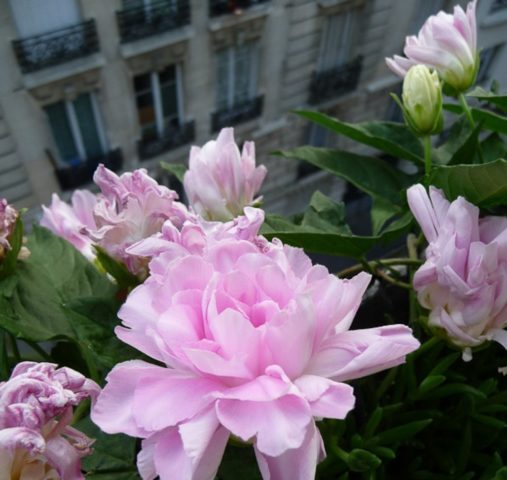
Terry kalistegia is ideal for vertical gardening of the site
Botanical description
Terry kalistegia or new, as the plant is also called, is a representative of the Bindweed family. Under natural conditions, it grows in countries with a temperate subtropical climate. Terry kalistegia is a perennial with herbaceous shoots, the length of which reaches 3 m. They have a brown smooth surface. The aboveground part of the plant dies off with the arrival of frost and resumes vegetation only in spring.
The shoots of the plant are thin, flexible, but very strong. Sharp dark green leaves with a heart-shaped base are located along their entire length. The plates are matte, on their surface you can see a relief pattern of veins. They are fixed to the main stem with petioles.
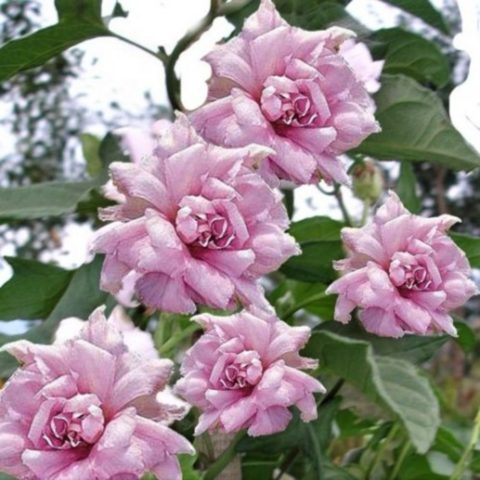
Terry calistegia is able to adapt to any climate
This type of war, like everyone else, is an aggressor. This means that the plant is able to grow into the surrounding area and gradually move in the garden. Liana is characterized by a well-developed creeping root system up to 1.5 m. In this case, the growth of new seedlings along its length is possible. Therefore, when planting a terry calistegia, it is recommended to deepen the limiters into the ground, which will not allow it to grow uncontrollably.
Also, a plant, in the absence of a special support, is able to find it on its own. And therefore, over time, the vine can master the crown of closely planted shrubs and trees, suppressing their growth.
Flowers in terry calistegia, like in fluffy ones, resemble a rose in appearance. But, unlike the latter, it has delicate petals and loose buds. They grow along the entire length of the shoots from the axils of the leaves. With full opening of the flower, its diameter reaches 1 cm. The shade of the petals is pale pink with a mother-of-pearl tint.
The terry kind of povoy blooms in July and continues until October. However, the beginning of the flowering period may shift depending on the light intensity. When planting in a sunny area, it occurs on time, and in partial shade - 2-3 weeks later. At the end of flowering, the fruits of the terry kalistegia are not formed.
Application in landscape design
This vine is very popular as an element of vertical gardening. This is facilitated by the rapid growth of shoots. They reach their maximum height in the second year after planting and already begin to form buds abundantly.
Liana is recommended to be planted near arches, pergolas, gazebos, balconies, and it can also be used to create green fences by placing seedlings close.
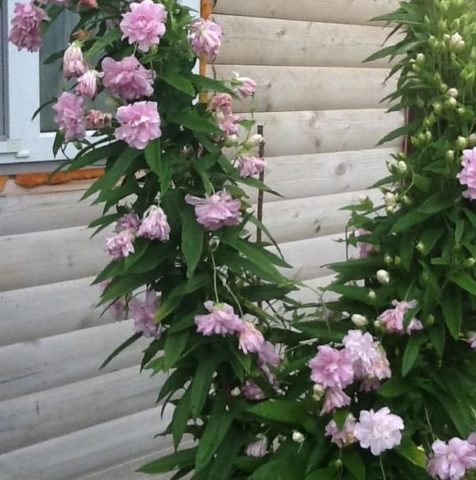
This vine is able to twine around any support in a short period.
Reproduction methods
Terry calistegia can only be propagated by dividing the root, since this part of the plant has a high regenerative capacity. To do this, you need to dig a liana with a clod of earth in the fall. It should be kept in the basement until spring, keeping the soil slightly damp.
In March, you need to get the calistegia, clean the root of the earth and wash thoroughly so that all the shoots are visible. After that, divide into segments 5-7 cm long, and sprinkle all fresh cuts with wood ash.
Delenki should be planted in boxes filled with moist nutrient substrate to a depth of 3-5 cm. When the sprouts grow to a height of 7 cm, they need to be pinched, which will stimulate branching. You can plant seedlings in a permanent place when the ground warms up well.
Planting and caring for terry calistegia
Liana will delight with its appearance and abundant flowering only with proper placement in the garden, as well as compliance with the requirements of the culture. Therefore, you should familiarize yourself with the conditions for planting and the features of further care for the plant.
Recommended timing
It is recommended to plant a povoy seedling at the end of May, when the topsoil warms up to a depth of 20 cm. You should also make sure that the threat of return frosts has completely passed. Otherwise, the lowered temperature can negatively affect the development of young pagons.
Site selection and preparation
For terry kalistegia creepers, you need to choose sunny open areas, protected from cold gusts of wind. The plant is not demanding on the composition of the soil, but it is important that the soil is nutritious and has good moisture and air permeability.
A week before planting, you need to dig up the site, and add humus at the rate of 5 kg per 1 sq. m. If the soil is clay, then additionally you need to add the same amount of peat and sand.
Landing algorithm
In advance of planting terry calistegia, you need to prepare any material that can really be used to limit the growth of its roots. In this capacity, roofing material or slate can be used.
Procedure:
- Dig a hole about 60 cm deep.
- Install slate or roofing felt on the sides.
- Pour into the center of the earth.
- Add 40 g of superphosphate and 20 g of potassium sulphide, mix thoroughly with the soil.
- In the middle, place a calistegia seedling so that the root is at a depth of 20 cm.
- Sprinkle with earth, compact the surface.
- Water abundantly.
When sprouts appear, they need to be pinched at a height of 7 cm to stimulate the branching of the vine.
Watering and feeding schedule
Terry Kalistegia easily tolerates a short drought. But in the absence of rain for a long time, the plant should be watered. This should be done 1-2 times a week with the soil getting 20 cm wet. You can also periodically spray shoots and leaves with water, which will help remove accumulated dust from them.
In hot periods of the year, peat or humus mulch should be laid at the base of the plant. This will prevent overheating of the root system and prevent excessive evaporation of moisture.
Throughout the growing season, the Kalistegia vine continues to form numerous buds. Therefore, the plant needs feeding. To do this, it is necessary to use organic matter in the spring, and use phosphorus-potassium mineral mixtures in the summer.
Pruning
Terry calistegia does not have the ability to clean itself. Therefore, every week you need to cut off faded buds, as they reduce its decorative effect. More drastic pruning should be done in late autumn with the onset of the first frost. During this period, the shoots of the creeper need to be cut off at the base.
Preparing for winter
Adult plants of terry calistegia do not need shelter for the winter. They can easily tolerate temperatures as low as -30 degrees. But young seedlings do not differ in such resistance. Therefore, until the age of three, the vine root should be sprinkled with a layer of peat or humus 10 cm thick.
The need for a transplant
Experienced gardeners do not recommend transplanting an adult vine, as it does not tolerate this procedure well. Calistegia can grow in one place for 10-15 years. And then the plant should be completely renewed.
Pests and diseases
Any florist can handle the cultivation of terry calistegia, even without many years of experience. After all, this plant has a high immunity to diseases and pests, so it will not cause much trouble.
But if the growing conditions are mismatched, the plant may suffer from powdery mildew. You can identify infection by a whitish bloom on the leaves. In this case, the plant should be completely sprayed with Topaz or Skor. Repeat the treatment every 5 days until the plant recovers and grows.
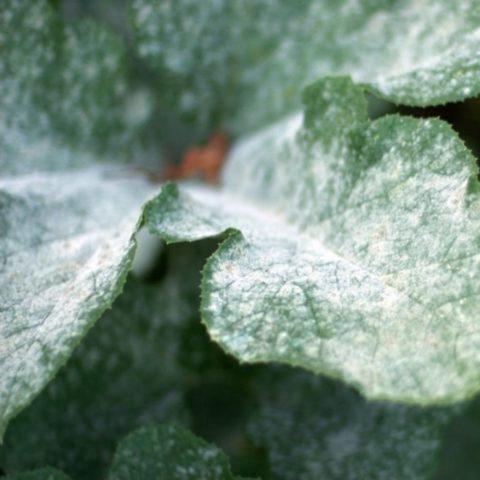
Powdery mildew causes premature leaf fall in poyas
Conclusion
Terry calistegia is a liana, which is distinguished by beautiful flowers of a pale pink hue. When minimal conditions are created, this plant is able to delight throughout the entire warm period. But at the same time, it is necessary to allocate another separate place on the site so that it does not interfere with the growth of other horticultural crops.
